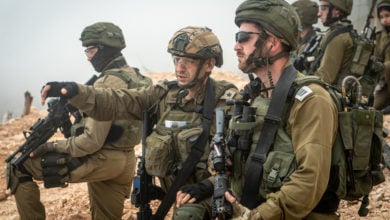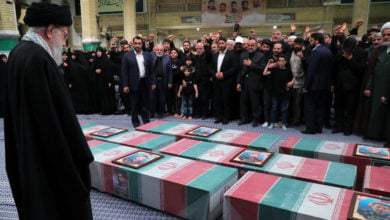Frustrated at their inability to defeat the Iraqi resistance and worried by a U.S. public that overwhelmingly opposes the war, U.S. forces are continuing their latest offensive in Baghdad.
President Bush’s escalation of the war—referred to as the “surge”—has sent 30,000 additional U.S. troops to Iraq in
 |
David Kilcullen, the senior counterinsurgency adviser to Gen. David Petraeus in Iraq, explained the campaign: “These operations are qualitatively different from what we have done before. Our concept is to knock over several insurgent safe havens simultaneously. … Unlike on previous occasions, we don’t plan to leave these areas once they’re secured.”
The “surge” has greatly increased the violence of the occupation.
In recent weeks, there have been reports of massacres carried out by U.S. troops. According to the United Nations, a June 30 raid in Sadr City killed 26 people, including women and children. Over 650,000 Iraqis have died since the March 2003 invasion.
Between April and June 325 U.S. troops died in Iraq. This is the highest three-month total of the Iraq war. As of July 3, the number of U.S. troops killed in Iraq is over 3,580. Another 900 U.S. contractors, mostly hired mercenaries, also have died.
During the “surge,” Iraqi resistance fighters have intensified their attacks. The Green Zone has been attacked by mortar fire almost everyday since January. On July 2, the 12th U.S. helicopter this year was shot down.
U.S. blames Iran, Hezbollah
That same day, Brigadier Gen. Kevin Bergner publicly accused Iran and Hezbollah of orchestrating a January attack that killed five U.S. soldiers in Karbala. Washington has been trying, unsuccessfully, to link Iran with the attack for some time. The military has offered no proof to substantiate its claims.
The new claim that a Hezbollah commander was involved in training the attackers is equally weak. Hezbollah fought victoriously against the U.S.-Israeli war on Lebanon in July and August 2006.
Iran and Hezbollah are targets of the U.S. war for domination of the Middle East. Starting in January, U.S. troops have had a “kill or capture” policy toward any Iranian citizen in Iraq.
Insinuating that Iran and Hezbollah are arming and training Iraqi resistance fighters is an attempt by the imperialists to provide cover for their military failures in Iraq and their aggressive plans in the Middle East.
Ruling class fissures
Key figures in the U.S. foreign policy establishment and in the military oppose the current strategy in Iraq. Everyone from Bill Clinton’s Secretary of State Madeline Albright to Richard Nixon’s Secretary of State Henry Kissinger and dozens of retired Generals have come out against Bush’s management of the war.
Genuine opposition to the war, however, is entirely absent from the debates in Washington. Leading Democrat and
|
On June 25, Senator Richard Lugar distanced himself from Bush in a widely publicized speech. Lugar is the ranking Republican member of the U.S. Senate Committee on Foreign Relations. His speech reflects a mounting urgency in ruling class circles to change direction in Iraq in a way that will help the U.S. military to continue to assert itself and preserve U.S. dominance in the Middle East.
Lugar summed up the bottom line for U.S. imperialist foreign policy: “We may make tactical decisions about the deployment or withdrawal of forces in Iraq, but we must plan for a strong strategic position in the region for years to come.”
He continued, “This is not just a maxim from diplomatic textbooks. The vitality of the U.S. economy and the economies of much of the world depend on the oil that comes from the Persian Gulf.”
Sen. Pete Domenici (R-N.M.) added his voice to the debate on July 5. Domenici stated he would sign onto a new bipartisan bill calling for most U.S. troops to leave Iraq by March 2008.
Although many politicians are talking about troop withdrawal, there is great anxiety about this. A perceived retreat from Iraq will weaken U.S. imperialism in the region.
U.S. imperialism has no plans to leave the Middle East. Washington currently hopes that the “surge” will provide a way to stay in Iraq with a smaller force, have an Iraqi puppet government and halt the spread of anti-imperialist resistance in the region. Its hopes are not likely to be realized.
On September 15, Gen. Petraeus will report to Congress about the “surge.” The ANSWER Coalition (Act Now to Stop War and End Racism) and other anti-war forces are preparing to march on Washington, D.C. the same day to channel the growing anti-war sentiment and demand an immediate end to the war.







